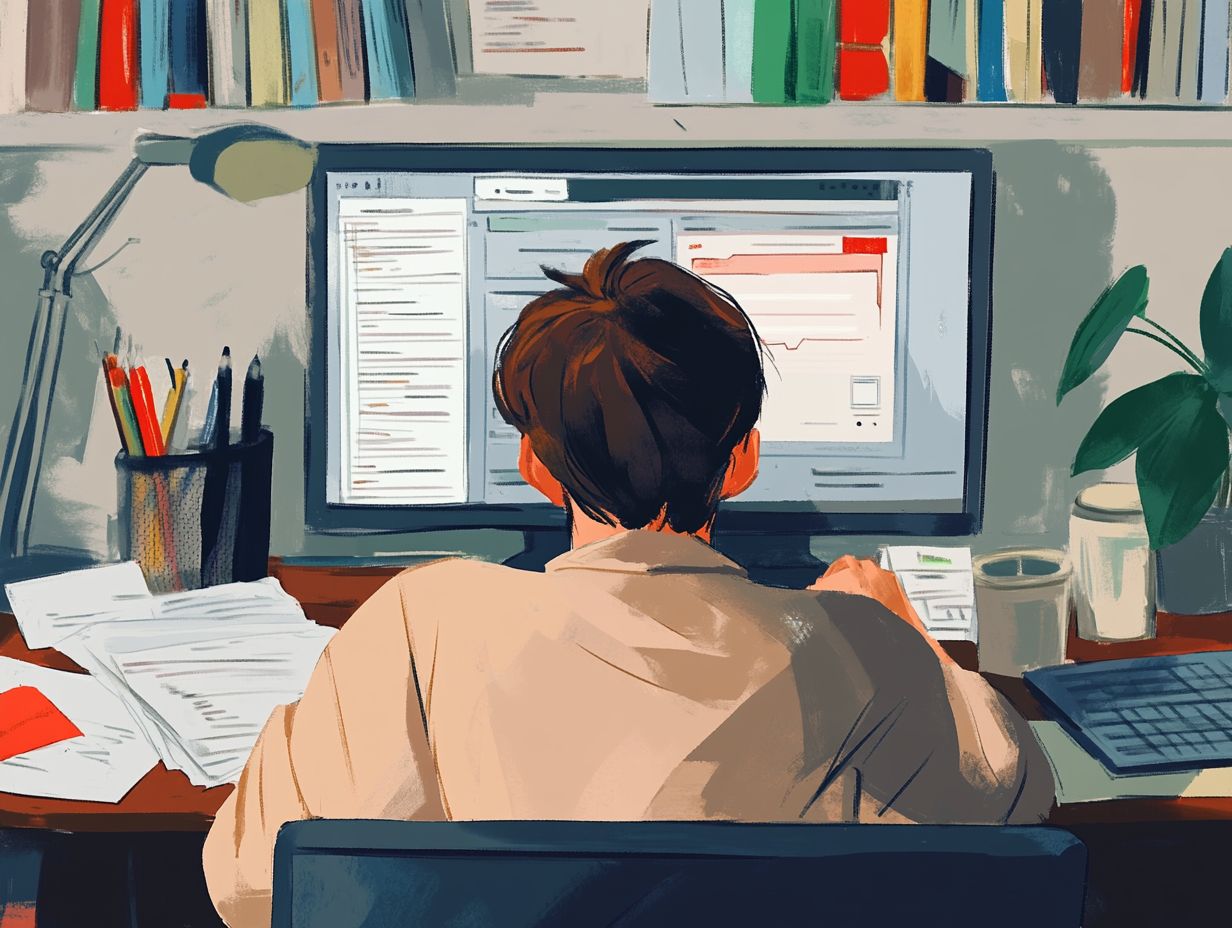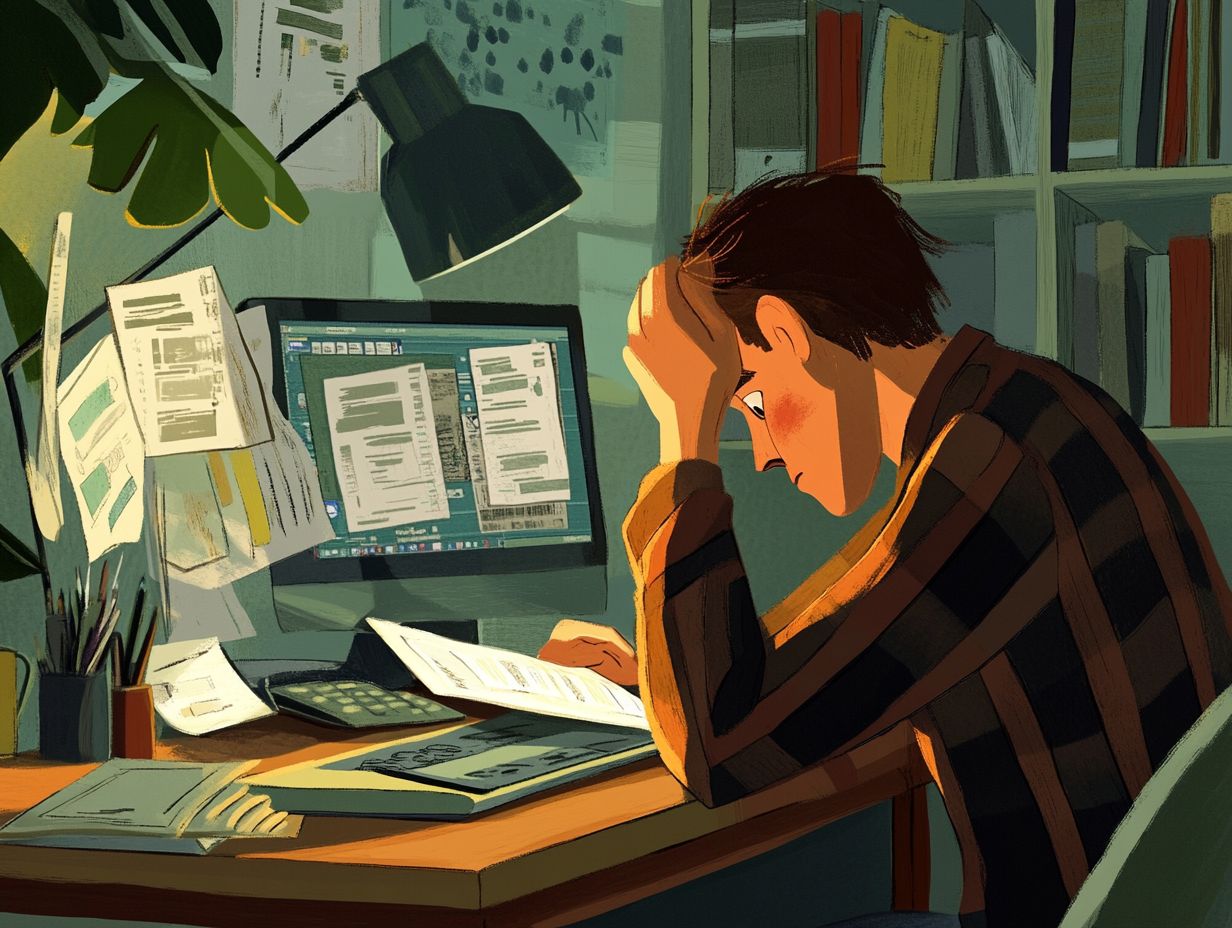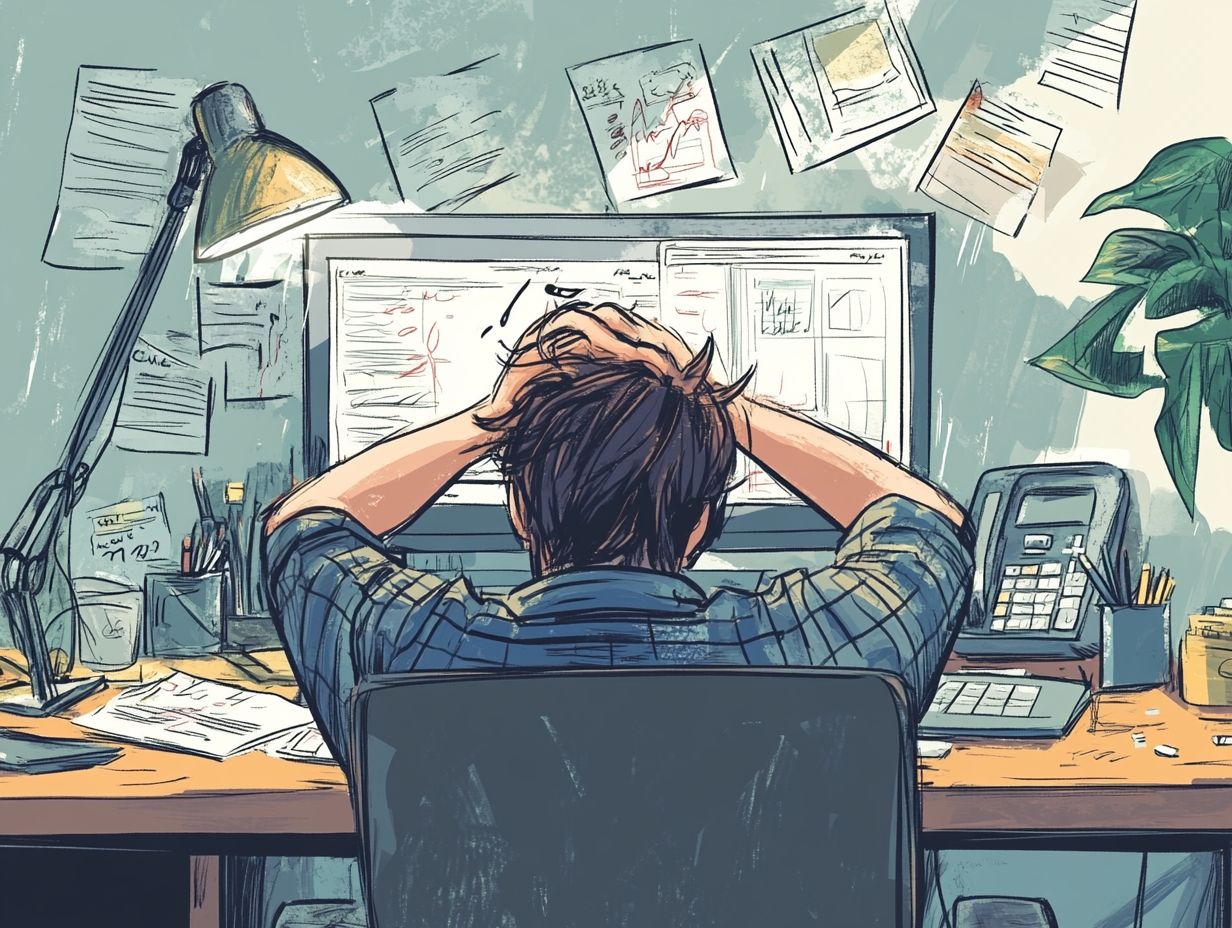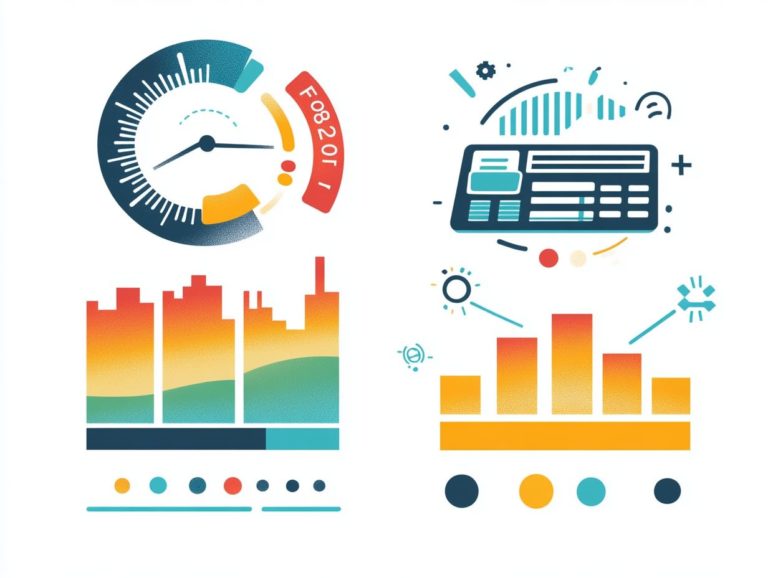What Happens When Your Credit Score Drops?
Understanding your credit score is essential for navigating the complex financial landscape. This article will guide you through what a credit score is, the factors that influence it, and the reasons it may decline.
You ll discover the impacts of a lower credit score, including the challenges you may face in securing loans and the likelihood of higher interest rates.
Actionable steps for rebuilding your credit will be outlined, along with advice on when it might be wise to seek professional assistance.
By the end of this article, you’ll feel confident and ready to take charge of your financial future!
Contents
- Key Takeaways:
- Understanding Credit Scores
- Reasons for a Drop in Credit Score
- Impact of a Lower Credit Score
- How to Improve a Low Credit Score
- Steps to Rebuild Credit
- Seeking Professional Help
- Frequently Asked Questions
- What happens when your credit score drops?
- What are the factors that can cause your credit score to drop?
- How much can a credit score drop?
- Can a low credit score be temporary?
- What can I do to improve my credit score?
- How long does it take to improve a credit score?
Key Takeaways:

- A credit score is a numerical representation of your creditworthiness, which is impacted by various factors such as payment history, credit usage, and credit mix.
- Missing payments, high credit usage, and identity theft can cause a drop in your credit score, making it difficult to obtain loans and credit with higher interest rates and fees.
- Rebuilding a low credit score requires steps such as making on-time payments, reducing credit usage, and seeking professional help if needed. It takes time and effort, but it is possible to improve your credit score.
Understanding Credit Scores
Understanding credit scores is essential for anyone aiming to manage their financial health effectively. These scores act as a vital indicator of your creditworthiness, impacting loan approvals and the interest rates you receive from lenders like Capital One.
Derived from credit reports kept by major credit bureaus such as Experian, Equifax, and TransUnion, credit scores evaluate various factors, including payment history, credit usage, and credit mix. This comprehensive snapshot of your financial behavior enables you to make informed decisions about your credit applications and your overall financial future.
What is a Credit Score?
A credit score serves as a numerical snapshot of your creditworthiness, typically ranging from 300 to 850, derived from the information in your credit report. This score shapes how lenders view your reliability and ability to meet financial commitments.
The most widely used scoring models FICO, a common credit scoring model developed by the Fair Isaac Corporation, and VantageScore, created by the three major credit bureaus assess several factors, including your payment history, credit usage, length of credit history, types of credit accounts, and any recent inquiries into your credit activity. Each of these elements plays a distinct role in determining your final score. For instance, consistently making on-time payments can significantly elevate your score, while high credit card balances can pull it down.
Ultimately, your credit score acts as a reflection of your financial responsibility, wielding considerable influence over lending decisions and the terms attached to them.
Factors that Affect Credit Scores
Several factors significantly influence your credit score, including payment history, credit usage, credit mix, and the frequency of new credit applications.
Among these, payment history carries the most weight; timely payments reflect your reliability and financial responsibility. A missed payment, however, can have a dramatic effect on your score, causing it to plummet.
Maintaining a high credit usage typically defined as using more than 30% of your available credit can signal financial distress, which in turn lowers your score. Derogatory marks, such as collections or late payments, linger on credit reports, weakening your score over time.
To manage these factors effectively, prioritize on-time payments, keep your credit usage low by paying off balances promptly, and regularly monitor your credit reports to dispute any inaccuracies.
Reasons for a Drop in Credit Score
A decline in your credit score can arise for a multitude of reasons, such as missed payments, elevated credit usage, identity theft, or even inaccuracies on your credit report. Each of these factors can profoundly affect your overall financial well-being.
Missed Payments or High Credit Utilization

Missed payments and high credit utilization can critically lower your credit score.
Overlooking due dates or failing to pay at least the minimum amount owed negatively impacts your payment history and raises a warning to lenders, suggesting potential money troubles.
This negative impact ripples through your overall credit score, complicating your ability to secure favorable loans or credit terms in the future.
Maintaining a low credit use level preferably below 30% is essential for effective credit management. Surpassing this level can suggest to creditors that you might be overly reliant on credit, jeopardizing your ability to access necessary credit when needed.
Identity Theft or Errors on Credit Report
Identity theft and inaccuracies on your credit report can lead to unexpected swings in your credit score, demanding your immediate attention.
These fluctuations can affect your lending rates and your ability to secure housing or employment opportunities. Regularly monitor your credit reports for any inaccuracies that might jeopardize your financial standing.
Implementing fraud alerts informs creditors to exercise extra caution before extending credit.
Seek guidance from credit counseling services for support in navigating disputes from identity theft or credit report discrepancies. This proactive approach ultimately safeguards your financial future.
Impact of a Lower Credit Score
A lower credit score can significantly affect your financial landscape, complicating your ability to secure loans, credit cards, and attractive interest rates on mortgages or auto loans.
Difficulty Obtaining Loans or Credit
If you have a lower credit score, securing loans or credit might be quite challenging. Lenders often perceive you as a higher risk.
This perception can lead to higher interest rates, stricter terms, or even outright denial of your loan applications, significantly limiting your financial options.
When lenders assess your creditworthiness, they typically look at factors such as your payment history, credit utilization, and length of your credit history.
This evaluation can be daunting if you have a limited or troubled borrowing background.
To improve your chances of loan approval, consider:
- Paying down your existing debts,
- Making timely bill payments,
- Obtaining a secured credit card to build a positive credit history.
Seek assistance from reputable credit counseling services for guidance on managing your finances and improving your credit score.
Higher Interest Rates and Fees
A lower credit score often leads to higher interest rates and fees, particularly on credit cards, mortgages, and auto loans. This can strain your finances.
When lenders evaluate your creditworthiness, they rely on your score as a primary risk indicator. If your score is low, lenders see you as a higher risk.
This can lead to higher rates, costing you more in the long run. Just a few percentage points difference on a mortgage can cost you thousands in additional payments over the loan’s life.
Understanding the long-term financial implications of these higher fees is crucial, as they can impede your ability to accumulate wealth and achieve financial security by diverting funds that could have been invested or saved.
How to Improve a Low Credit Score

Enhancing a low credit score requires a strategic approach.
Consider seeking credit counseling for expert insights, setting up payment reminders to ensure timely payments, or exploring a credit builder loan to strengthen your credit history.
Each of these steps can play a pivotal role in elevating your financial standing.
Start today! Take small steps to boost your credit and secure your financial future.
Steps to Rebuild Credit
Rebuilding credit involves several essential steps that you should take to establish a solid payment history and maintain responsible credit use across all your accounts.
To embark on this journey, consistently making on-time payments is crucial, as late payments can significantly damage your overall credit score. It s equally important to utilize credit responsibly by keeping the amount of credit you use ideally below 30% of your total available limit.
Regularly monitoring your credit accounts helps catch discrepancies early. This ensures you are informed about any changes or potential fraud.
By diligently implementing these strategies, you can improve your credit score and demonstrate to lenders that you are a responsible borrower.
Seeking Professional Help
If you re finding it challenging to improve your credit score, seeking professional help through credit counseling could be a smart move. This option allows you to gain a clearer understanding of your financial situation and credit report.
These experts offer invaluable insights into pinpointing the root causes of poor credit and provide personalized strategies to address existing debt.
By analyzing your spending habits and current financial obligations, they can help you craft a tailored plan that caters to your unique circumstances. This personalized approach will boost your credit score and help you manage your money better, empowering you to make informed financial decisions.
Connecting with credit counselors can pave the way for financial stability and bolster your confidence in your economic future.
Frequently Asked Questions
What happens when your credit score drops?
When your credit score drops, it means that your ability to repay loans has decreased, and lenders may view you as a higher risk borrower. This can result in difficulties obtaining loans, higher interest rates, and potential denial of credit applications.
What are the factors that can cause your credit score to drop?

There are several factors that can cause your credit score to drop, including missed or late payments, high credit card balances, opening multiple new credit accounts, and applying for too much credit at once.
How much can a credit score drop?
The amount by which your credit score can drop varies depending on the individual’s credit history and the severity of the negative impact. However, a single missed payment can cause a drop of 100 points or more in a good credit score.
Can a low credit score be temporary?
Yes, a low credit score can be temporary. As long as you address the issues that caused the drop and make efforts to improve your credit habits, your score can increase over time.
What can I do to improve my credit score?
To improve your credit score, you can start by making all payments on time, keeping credit card balances low, avoiding new credit applications, and regularly checking your credit report for errors. Working with a credit counselor can be a game-changer for your financial future!
How long does it take to improve a credit score?
The time it takes to improve a credit score can vary depending on the individual’s credit history and the actions they take to improve it. Generally, it can take several months to see significant changes, but consistently practicing good credit habits can lead to a gradual increase over time.






